Can you live up to the greatness of Alexander?
Type: Single-player
Genre: Strategy
Developer: Kube Games
Publisher: Kube Games
Release date: 7 Oct, 2021


Last year, in June of 2020 Imperiums: Greek Wars was released. It was a solid grand strategy or 4X game (landing somewhere in-between) that focused on the Greek Peninsula and its surrounding during the time of Philip II of Macedon, one of the great leaders of the era who would lay the groundwork for the events to come. Since then a free DLC called Imperiums: Troy was released, based around the Homeric epic, and now the first paid DLC has hit the market, Age of Alexander.
Age of Alexander takes place during the time of Alexander the Great, the man who would end up building a huge empire, stretching from Greece all the way to India, and would leave a lasting mark on the world, despite his early death.
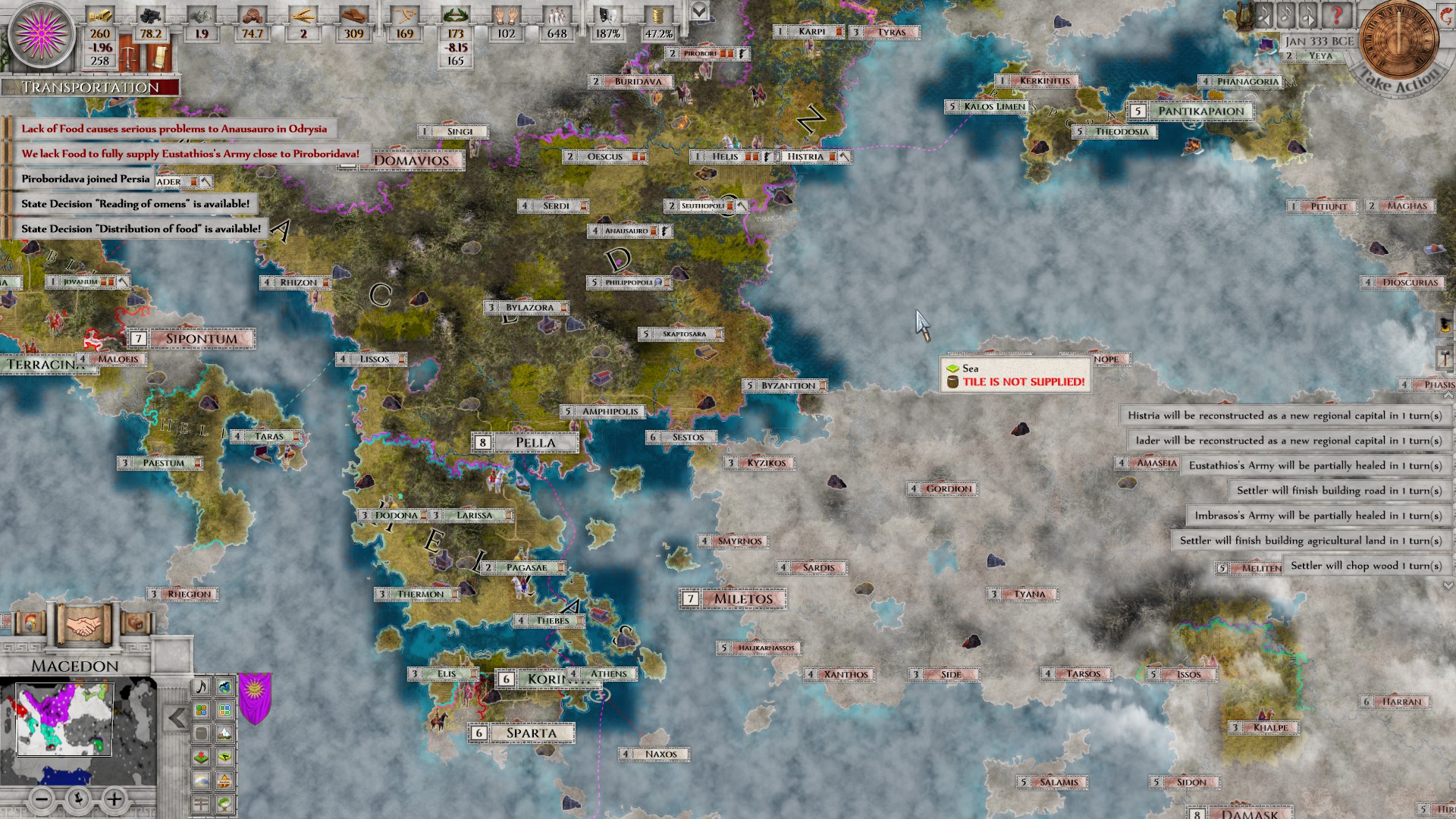
History
There’s a lot of things we don’t know for certain about how Alexander the Great came to power. Philip II, his father, had died, though we don’t know who ordered the murder, or why he was murdered. Some historians believe that it was an assassination ordered by Alexander, as Philip’s new wife made his position as heir less certain, others put the blame on Philip’s uncle in law. Whatever the reason for the murder was, Alexander found himself on the throne of Macedon at the age of 20.
Alexander was an ambitious man, much like his father, and had military experience, having commanded armies against the Thracians to the north at the tender age of 16. His first order of business as king was to secure the Balkans, and he would later go on to defeat the mighty Persian empire and its subjects, conquer Egypt and make his way to current day India, where it’s said that the elephants of the Indian armies dissuaded him from continuing (something that is very likely to be apocryphal, as according to contemporary accounts the armies of Alexander the Great were able to adapt and defeat the elephants that were used against them).
At the age of 32, mere 12 years into his reign, Alexander died, and his empire was split up among his heirs. Several nations were formed that would go on to fight over who was the true heirs to Alexander. Alexander had also brought with him the Hellenic culture and in some places those who had a Greek origin would end up becoming a privileged class, most notably in Egypt.
Alexander might have conquered his way to India, but Macedonia was not the only mighty nation that existed during this time. Persia to the east had consolidated its power, and held a lot of land, both directly and indirectly. Egypt and Anatolia were subjects of theirs and Persia itself was a large and wealthy empire, which controlled the important trade routes that connected Europe and Asia. It was by no means a foregone conclusion that they would fall to Macedonia, as they were wealthy and had not just a large army, but a lot of influence over the region. And to the west a tribe in current day Italy was starting to flex its military muscles.
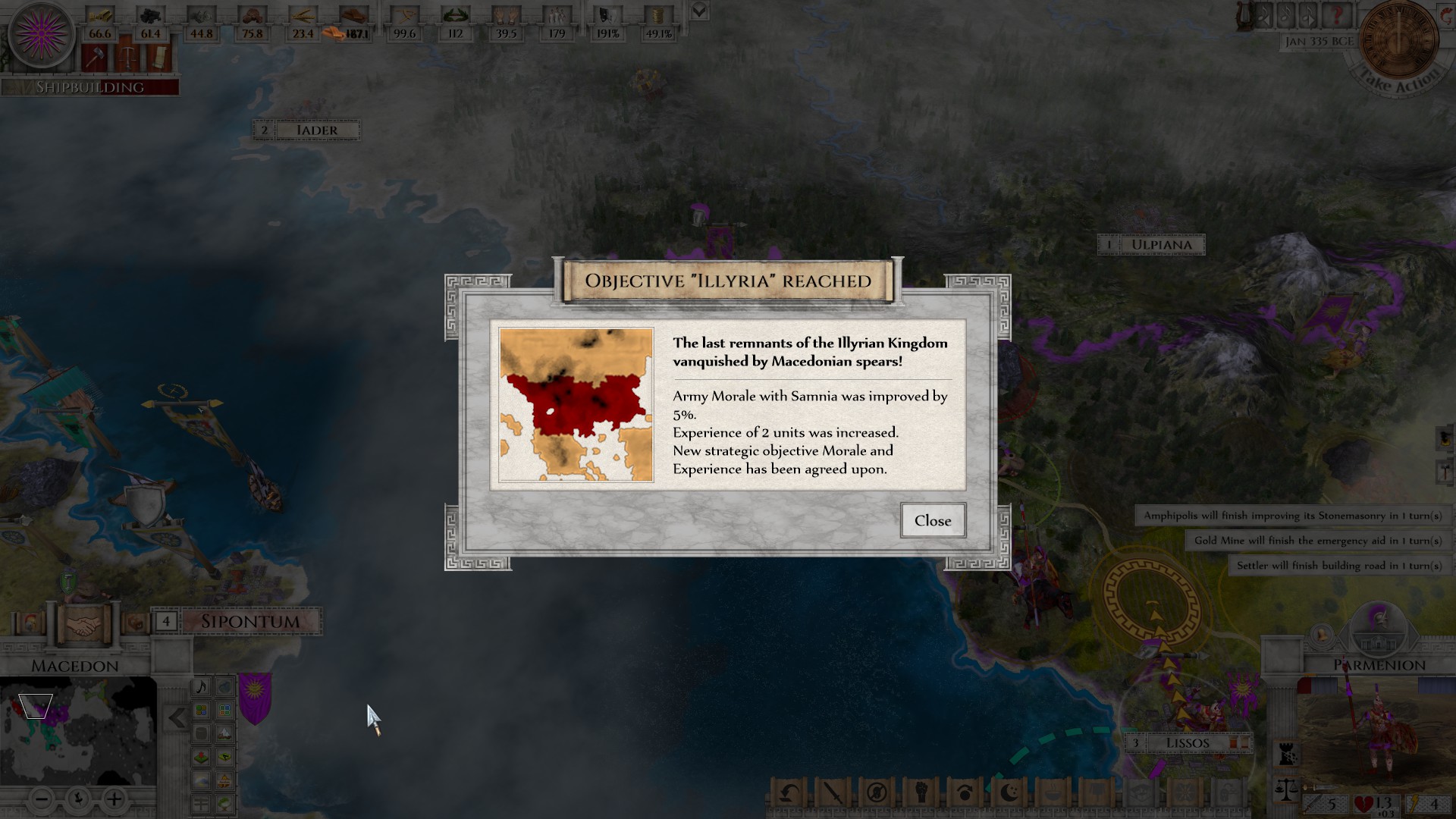
The New Campaign
Age of Alexander brings with it a new campaign, fittingly enough called Age of Alexander. It starts right as Alexander the Great has been crowned king of Macedon. The new map for the campaign stretches from current day Italy and Tunisia to roughly halfway into modern Iran (ending just a bit east of current day Teheran).
The map holds quite a few nations, from the mighty Macedonia and Persia, and their subjects, to more minor factions like Scythia and Rome, both of which would end up having a major impact on history, but not just yet. Not all nations were born equal though, and some are significantly easier to play than others. Persia, having the strongest starting position, are likely to be the easiest, though Macedon is also very powerful, while the Bosporous tribes and the Thracians start comparatively weak. The Thracians in particular are in a bad position as they’re likely to attract the attention of the Macedonians at a very early stage. Some other nations have the potential to become major powers, like Carthage, even if their starting positions are not quite as strong as those of Persia or Macedon.
Rome and Carthage also has new army types available that are different from their eastern neighbours. They still function the same way as other armies, but have slightly different stats and terrain bonuses/penalties. The difference is noticeable, but not so different that it radically changes how it feels to use them in combat.
Overall the new campaign map is quite good, and manages to capture the main power dynamics of the era. Hyper-expansion was never the main strength of Imperium: Greek Wars though, so don’t expect to just blitz into Asia as Alexander. Military conquest takes a bit more care and effort in this game than in many other similar games.
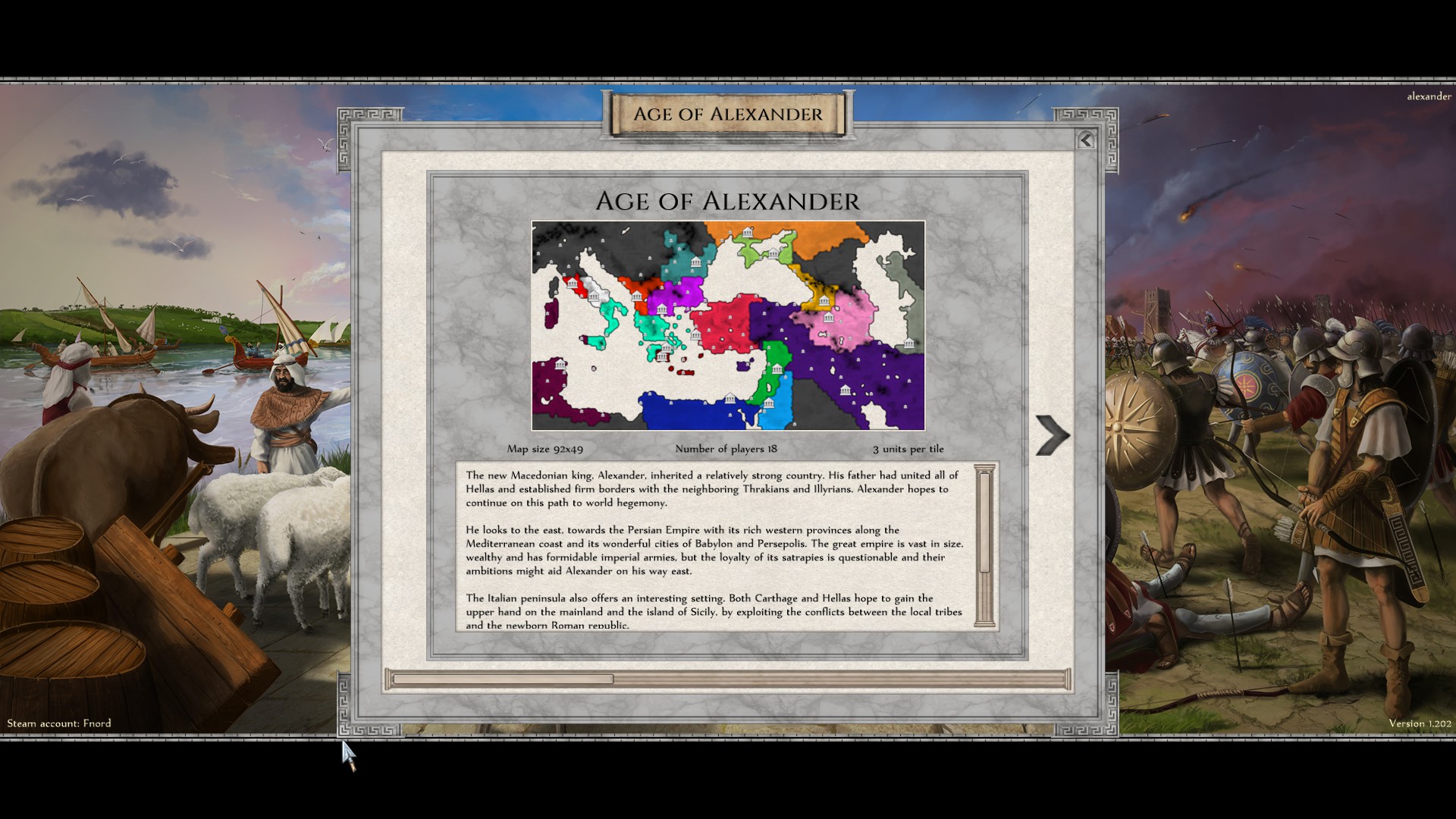
The New Mechanics
With the new DLC comes a bunch of new mechanics. The Age of Alexander campaign will always have these on, but in order to play with the new mechanics in any other campaign, you’ll need to load it as a mod.
One of the most noticeable changes is how corruption has been tweaked. How high corruption gets is now depending on how far from the capital a city is. This is a pretty good representation of how things would have worked in the real world, as the government would have less insight into these more remote regions, and thus the ruling elite there would have been able to get away with ignoring their duties and hiding resources. Thus higher corruption reduces income, so cities that are far away from a capital can become next to useless. In order to manage corruption you need to assign provincial capitals. These can’t be too close to each other, or your main capital, though they work as secondary capitals when it comes to reducing corruption. A provincial capital does not have to be a large city though, any city will do.
Army management has also been changed. You still recruit armies the same way as you used to. In the ancient era, and really up until recent times, it was rare to have a standing army, instead soldiers would be sent home to tend the farms and take care of the harvest when they did not need to fight. Armies can now be put in reserve in cities, which gives you some population back, and don’t need to pay any upkeep, but armies that are in reserve will slowly loose experience, and they can even get negative experience, which makes the army worse than if it was newly trained. Bringing armies out of reserve is also not an instant process, though it is faster than training new armies.
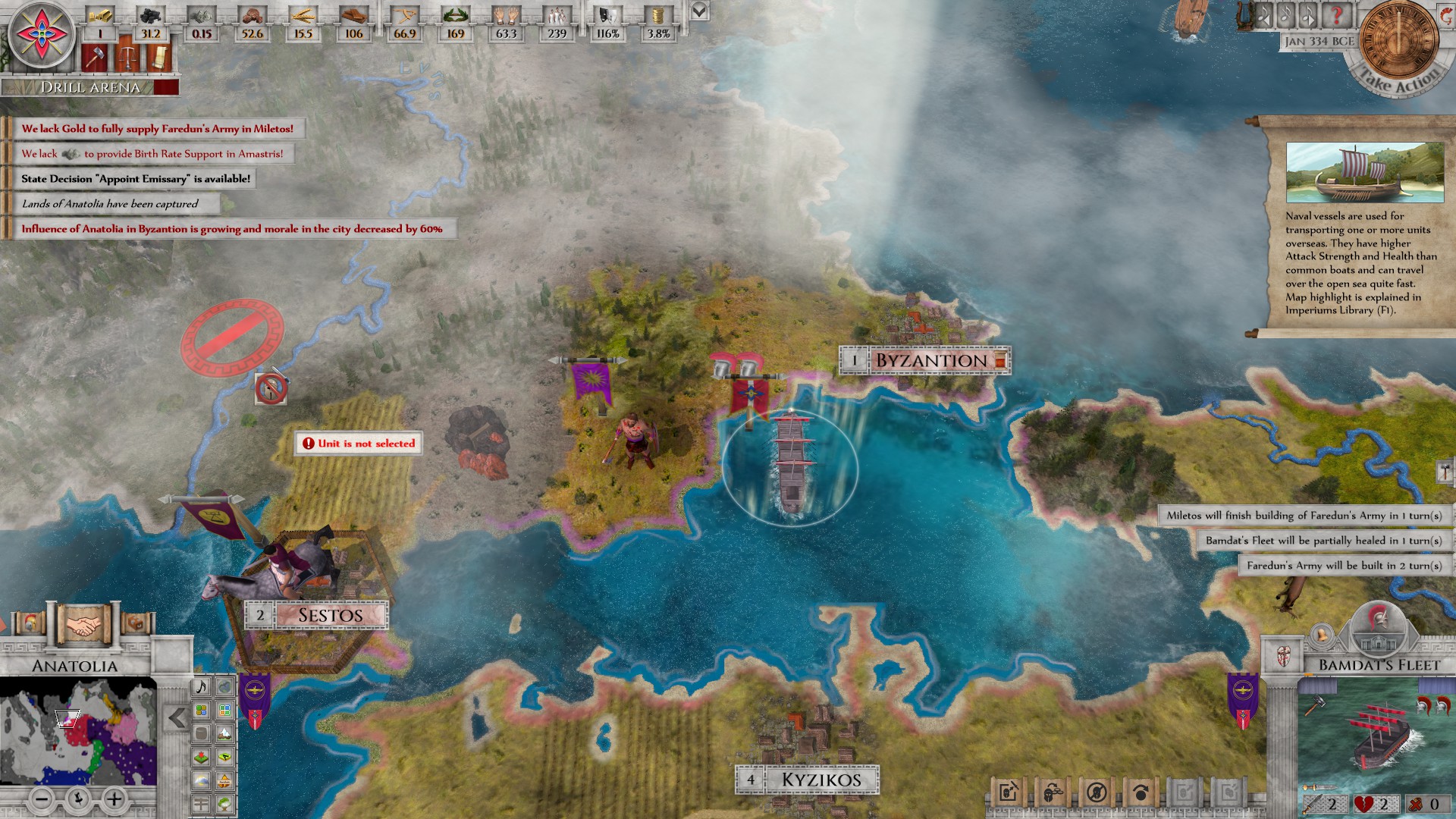
Emissaries are new units that work similarly to generals or heroes, as they function like units on the map, but they don’t fight. They’re recruited the same way as generals, though state decisions. Emissaries can move freely across borders, though not through enemy units or cities, and do have line of sight, which means that they can bring back information about enemy lands. Their main job is to improve your diplomatic standing with your though neighbours, while at the same time hurting the relationships your nighbours have with their other neighbours. Once an emissary is in place it can improve relationship between you and the other nation, and it can also praise or slander other nations, which influences the relationship between the nation your emissary is in, and the praised/slandered nation. There’s a risk to slandering nations though, as the target might find out about it, and dislike you for your actions.
A more minor new addition is the resource refineries. City/blacksmith upgrades that improve resource output from nearby mines of a specific type. Each one gives a significant boost to the production of mines that are within three tiles. While you can build as many resource refineries as you want in a city, the more you have, the more expensive they get.
The new mechanics have a noticeable effect on how you play Imperium: Greek Wars and adds some more depth to the game. That’s not to say that the game did not already have a fare bit of depth already, but now there’s more of it. They’re not so major that it feels like you’re playing a brand new game though.
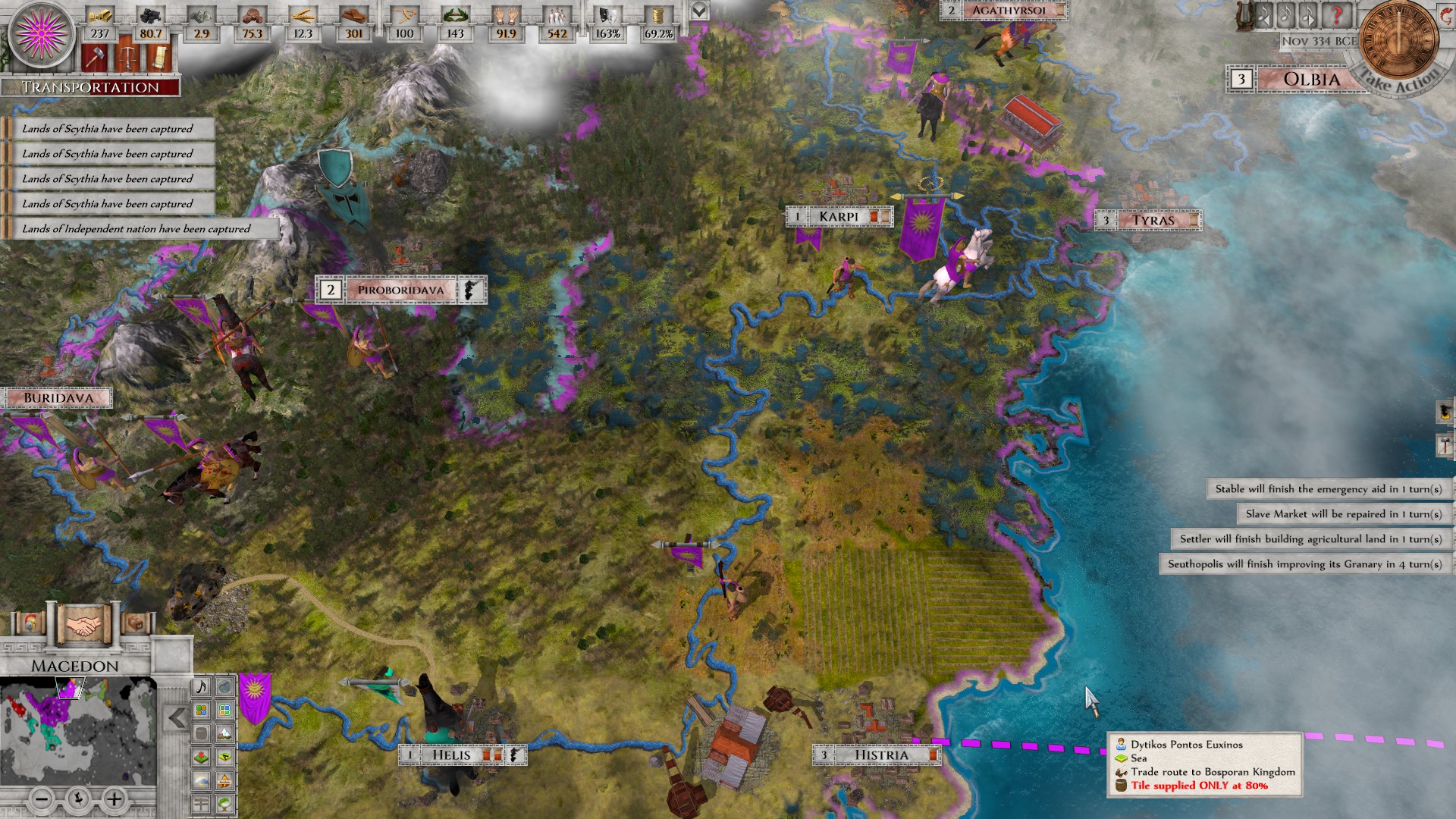
Closing Thoughts
Imperium: Greek Wars was a game that was worth playing at launch, and this DLC just adds more to an already very solid game. The new mechanics are maybe not game changing enough to justify buying the DLC for on their own, but together with the new campaign you do get a lot of new content for your money here. The new mechanics feel well thought out and fit in, without feeling like they add too much bloat, and the new campaign is really good, although the fact that the Persian empire had so many subject states at this time might annoy a few people who don’t like hitting up against the mighty Persians when they try to expand.
If you enjoyed Imperiums: Greek wars and think the time of Alexander the Great is a fascinating time period, then this DLC is well worth getting. Even if you’re lukewarm on Alexander the Great, but really enjoyed Imperiums, then this DLC is still probably worth the price.










